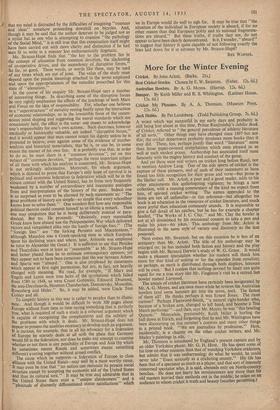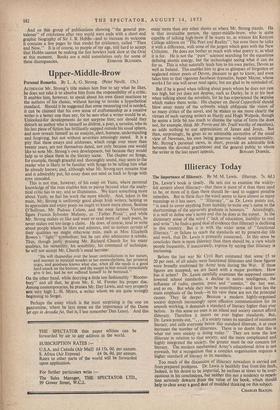More for the Winter Evening
Cricket. By John Arlott. (Burke. 21s.) A WORK which was successful in my early days and probably is still being lent about at this time, Prince Ranjitsinhji's Jubilee Book of Cricket, referred to "the general prevalence of athletic literature of all sorts." Other things may have changed since 1897, but not this; the cricket department probably produces more books than it ever did. These, too, perhaps justify that word "literature" more than those paper-covered compilations which once pleased us so well at such modest prices. Authorship has associated itself most famously with the mighty history and conduct of the game.
And yet there were real writers on cricket long before Ranji, not to mention Andrew Lang. One of the side sports of cricket is the capture of these pioneers, and of such of their successors as have found too little recognition for their prose and verse—but prose is the likelier call. Mr. Arlott, a poet and a great reader, adds to his other attainments this anthologizing vigilance; he brings a new collection, with a running commentary of the kind we expect from him, of spirited cricket writing. The names• appended to the items are not all unfamiliar—in this reference—but altogether his book is an education in the resources of cricket literature, and much more joyful than education commonly sounds. It is impossible to give a full detail of his catches, but he has for example a chapter headed, "The Works of J. C. Clay," and Mr. Clay the bowler is not at, all diminished by his occasional consent to take a pen and make his jokes—his jokes. This anthology from Mr. Arlott is illustrated in the same style of variety and discovery as the text possesses. Next comes Mr. Swanton, but on this occasion he is less of an antiquary than Mr. Arlott. The title of his anthology may be enlarged on: he has included both fiction and history and the play begins with Mr. Bgrnard Darwin's study of W. 0: Grace. It would make a pleasant speculation whether his readers will thank him more for that kind of writing or for the episodes from novelists; or perhaps, as merit is distributed through, both displays, honours will be even. But I confess that nothing devised by fancy can quite equal for me a true story like Mr. Fingleton's visit to a retired fast bowler named Larwood.
The annals of cricket literature have certainly been invigorated by Mr. A. G. Moyes, and are once more while he reviews the Australian bowlers (and some batsmen get into the scene, too). The fastest of them all? He thinks perhaps it was Ernest Jones. The most curious? Perhaps Fleetwood-Smith, "a natural right-hander who, because of a broken arm, changed to left hand, and became a Test Match performer"—and then, says Mr. Moyes, he was "this bowling Quixote." Meanwhile, presumably, Keith Miller is hurling the ball down at Edrich, and forgetting that he and Mr. Whitington have been discoursing on this summer's contests and many other things in a printed book. "We are journalists by profession." Here, incidentally, is a chapter on the other cricket writers, and Mr. Mailey's paintings in oils. Mr. Thomson is introduced.by England's present captain and by an older Yorkshire player, Mr. G. H. Hirst. He has spent some of his time on other missions than that of watching Yorkshire cricketers, but admits that it was embarrassing; do what he would, he could never take "Essex seriously as a cricketing county." His life has been that of a spectator as much as a player, and that sort of intensely concerned spectator who, it is said, abounds only on North-country benches. He does not hurry his reminiscences any more than his old masters hurried their methods out in the middle; he relies on an audience to whom cricket is truth and beauty (weather permitting.) And so this group of publications showing " the general pre- valence" of cricketana after two world wars ends with a short and graphic biography of Sir J. B. Hobbs--and to increase its welcome it contains a few pages by that model for cricketers, called "Then and Now." It is of course, to people of my age, still hard to accept that Hobbs cannot be making the fast bowlers look slow at the Oval at this moment. Books are a mild consolation only for some of



































 Previous page
Previous page